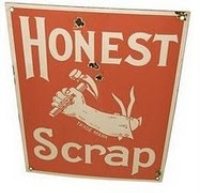Recently, the actor Shia LaBeouf got into trouble over allegations of plagiarism. Apparently, he made a short film that was too similar (too similar, that is, to be coincidental) to one of Daniel Clowes' graphic novels, Justin M. Damiano. He then made several public "apologies", including an apology in skywriting that said, "I am sorry Daniel Clowes." He also wrote several Tweets that alternately apologized and defended his actions.
Here are a few examples of how he apologized:
In my excitement and naiveté as an amateur filmmaker, I got lost in the
creative process and neglected to follow proper accreditation.
Copying isn’t particularly creative work. Being inspired by someone
else’s idea to produce something new and different IS creative work.
The thing is, that second statement about copying was later alleged to be plagiarized from something that someone named Lili wrote on Yahoo answers. Here's Lili's statement (which I read about on Buzzfeed.com): Merely copying isn’t particularly creative work, though it’s useful as
training and practice. Being inspired by someone else’s idea to produce
something new and different IS creative work, and it may even
revolutionalize [sic] the ‘stolen’ concept.
So basically, after plagiarizing Daniel Clowes' work for his film, he plagiarized someone else for his apology!
(Excuse me while I go bang my head against the wall.)
Daniel Clowes expressed shock over what happened, and I'm not sure if he's going to sue LaBeouf or not. I'm a little familiar with Clowes' work; I read his graphic novel Ghost World, which I really liked and thought was very well-written. If I was him, I'd be enraged that someone stole my work and then didn't really apologize for it. I think one reason that actor is in so much trouble right now isn't just because he plagiarized; it's because he's trying to rationalize his actions.
I teach writing, so I know that sometimes people forget to credit their sources. But if they lift entire passages or even brief excerpts from other people's work and claim it as their own, that's still plagiarism. And I think that LaBeouf's claim that he was "inspired by someone else's idea to produce something new and different" doesn't really apply to his film.
Clueless is a 90s teen movie version of Jane Austen's Emma. The movie 10 Things I Hate about You is a 90s teen movie version of The Taming of the Shrew. Why didn't those filmmakers get in trouble? Because for one thing, they took the premise from those stories and really did create something new, so that the filmmakers' story, though based on those earlier works, really did become the filmmakers' own stories.
A lot of people do that. I mean, consider how often the Cinderella story has been retold and revised. The same thing goes for books like Jane Eyre and plays like Romeo and Juliet. On the other hand, I've read books that took actual characters from previously published stories by other authors and "gave them a different spin" or interpretation, which would be good if it wasn't for the fact that some (though not all) of those authors try too hard to sound exactly like the authors of those previously published stories. (One notable exception would be Jean Rhys, who "wrote a life" for the mad wife locked up in the attic in Jane Eyre; that book was excellent and Rhys didn't try to sound like Charlotte Bronte at all.)
I've never been published. But that doesn't mean I've never been plagiarized. A few times, I've seen lines that I wrote for this blog and my Twitter page show up in other people's blogs and Twitter pages (side note: I'm not talking about retweets, since at least with those they give me credit for the Tweets I wrote. And I LOVE retweets, and I often return the favor.). To say that I was angry would be an understatement. I considered confronting them and demanding that they either take down the posts where they stole my lines or give me credit. I also considered finding out where they lived and egging their cars or spray-painting the word THIEF on their houses, or perhaps finding a way to force them to watch marathons of Dance Moms AND Here Comes Honey Boo Boo! But what I really did was nothing. What could I do, when it was only a line here or there? But if someone plagiarizes me to the extent that LaBeouf plagiarized Clowes (though I must admit I haven't seen LaBeouf's film, partly because I think he took it down after the allegations surfaced), I'd fight back like one of the Dance Moms does when one of their daughters gets passed over for a solo. My writing, while far from perfect, is nevertheless something that's MINE, and I think that any writer would be upset to know that someone stole the words right out of their work.
What do you think? Have you ever been plagiarized? Even if you haven't, what would you do if someone plagiarized you?
Story Snip from Larksong: Chapter 34, and an Insect Hotel
-
[image: W]
ow!
We're nearing the end of the story.
I'm going to try to post right up until the end of June, which will mark a
full year of sharing snips!...
1 hour ago







